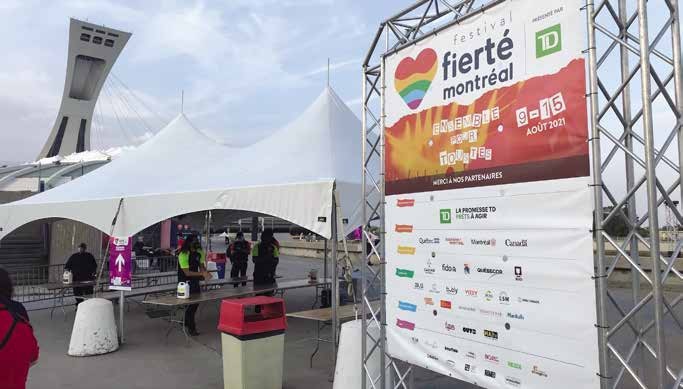Safety and Security at Pride
What’s involved in keeping everyone safe
By Anna-Liza Badaloo

The queer community is welcoming the return of in-person Pride celebrations with open arms. But we’re all a little rusty at gathering in large groups, triggering concerns about safety and security.
QBiz sat down with Pride organizers from Montreal, Vancouver and Toronto to learn what security measures their festivals are taking this year and how attendees can keep themselves and each other safe.
➤ HANDLING COVID UNCERTAINTY
When it comes to COVID, Pride organizers are working closely with public health authorities and have layers of back-up plans. Organizers have learned how to hold smaller Pride events safely (including increased hand sanitizer and social distancing) that truly engage the community. Bonus: all major festivals will include a virtual element, with many planning to livestream key events. “There is still a level of uncertainty within the community,” acknowledges Sherwin Modeste, executive director of Pride Toronto. “We’re moving ahead, but there is a constant ‘what if’ scenario.”
➤ ANETWORK OF PRIDE SECURITY
Few people are aware of the complex security infrastructure that underlies the glitz and glamour of Pride. “We work closely with the City of Vancouver year-round to develop traffic and safety plans with all the related agencies,” says Lee Keple, interim executive director of the Vancouver Pride Society. “There are many details that most folks would never give a second thought to – lights, rerouting transit and power, safety and bylaw enforcement, police, fire and other emergency vehicles.”
When it comes to Pride parades, there is much oversight and teamwork with municipal governments. To assess all the moving parts from a safety perspective, Keple always asks, “Given the location, time, size and the different facets, are we good with what we’ve put in place to look after each other?”
Fierté Montréal’s move to a new venue means all the security with none of the fencing. “Moving to the Olympic Stadium, we don’t need a fence at all because it’s already a concrete jungle,” explains Simon Gamache, executive director of Fierté Montréal. “In the past year, there have been national and domestic terrorist incidents. At this site, we feel very safe.”
➤ QUEER-FRIENDLY SECURITY
Inappropriate actions by security staff can quickly turn safe community spaces into traumatizing ones. What do Pride festivals look for in security firms? “We’re focusing on queer-friendly security firms that understand and reflect the community,” explains Modeste. “Do they have BIPOC staff? Do they understand trans issues?”
Pride Toronto will ensure that security firms amplify their work. “We’re going to train all our security companies to ensure that there are fully in line with the mission, vision and goals of Pride Toronto.”
➤ KEEPING EACH OTHER SAFE
To help the community re-learn how to do Pride safely, organizers are making strategic use of their communication channels. “Our general communications plan will include more reminders,” says Keple. “Gentle refreshers for folks coming down to the parade would not go amiss.” Such tips will include Pride survival basics (like wearing sunscreen, staying hydrated and wearing comfy shoes) and personal safety reminders, like not leaving your drink unattended.
Fierté Montréal is planning on-site safety signage focused on respect. “We will have a code of conduct to encourage attendees to respect the site and the people around them,” says Gamache. “People might be a bit wilder, and not as used to paying attention to their surroundings.”
Pride Toronto is taking a novel approach to harm reduction. “We’re going to be very deliberate with a more universal harm reduction approach,” says Modeste. “Not just focusing on substance use, but also how someone can maintain their own safety during the festival.” Harm reduction teams will be clearly identified so attendees can get help fast. This also means that security can quickly get harm reduction staff to where they are most needed.
And let’s not forget about safe sex. “We’re making sure that safe sex information and resources (including condoms) are available throughout the festival,” says Modeste. “We’re taking it one step further by including condoms for inserting. We’re catering to more than just one group and asking, ‘Who have we been missing in all this?’”
Ultimately, it’s about looking after yourself and keeping each other safe. “Looking left, looking right – who’s there?” notes Keple. “They’re part of your community. If you’re willing and able to help other folks, let’s do that. It’s part of community capacity and good community energy.”